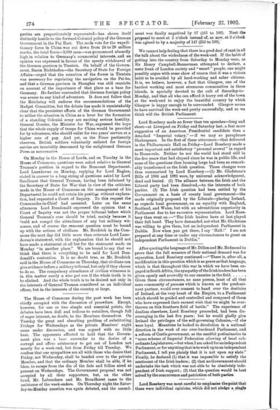On Monday in the House of Lords, and on Tuesday
in the House of Commons, questions were asked relative to General Truman's position in regard to the Remount Department. Lord Lansdowne on Monday, replying for Lord Raglan, stated in answer to a long string of questions waked by Lord Sandhurst that General Truman, having been informed by the Secretary of State for War that in view of the criticism made in the House of Commons on the management of his Department he could not retain his positi.a without explana- tion, had requested a Court of Inquiry. To this request the Commander-in-Chief had assented. Later on the same afternoon Lord Dundonald expressed the opinion that a Court of Inquiry was not the proper tribunal before which General Truman's case should be tried, mainly because it could not compel the attendance of any but military wit- nesses, and of course the remount question must be bound up with the actions of civilians. Mr. Brodrick in the Com- mons the next day did little more than reiterate Lord Lans- downe's statenlent, with the explanation that he should not have made a statement at all but for the statement made on Monday "in another place." We are bound to say that we think that there is everything to be said for Lord Dun- donald's contention. It is no doubt true, as Mr. Brodriok said in the House of Commons on Thursday, that civilians can give evidence before a military tribunal, but only if they choose to do so. The compulsory attendance of civilian witnesses is in this matter surely a sine qua non if the whole truth is to be elicited. And the whole truth is to be desired not only in the interests of General Truman considered as an individual officer, but in the interests of the country at large.










































 Previous page
Previous page